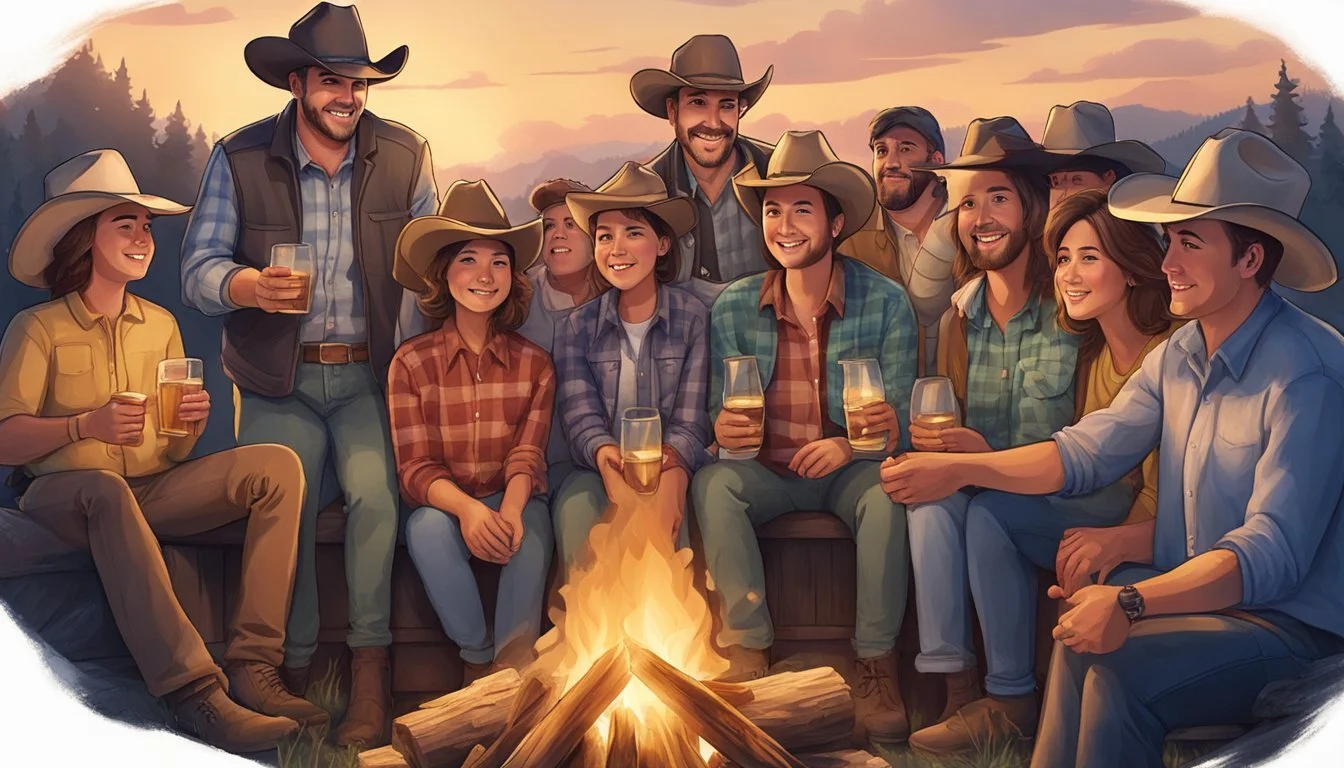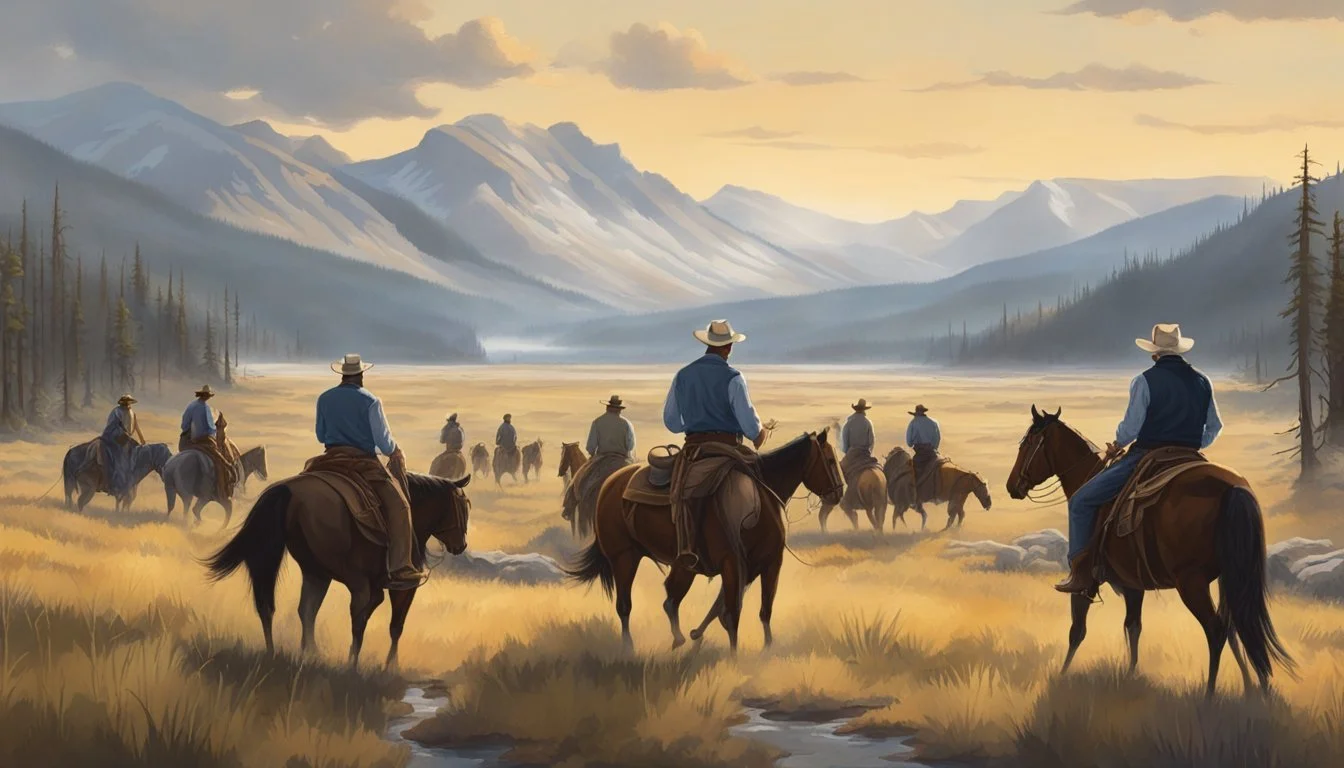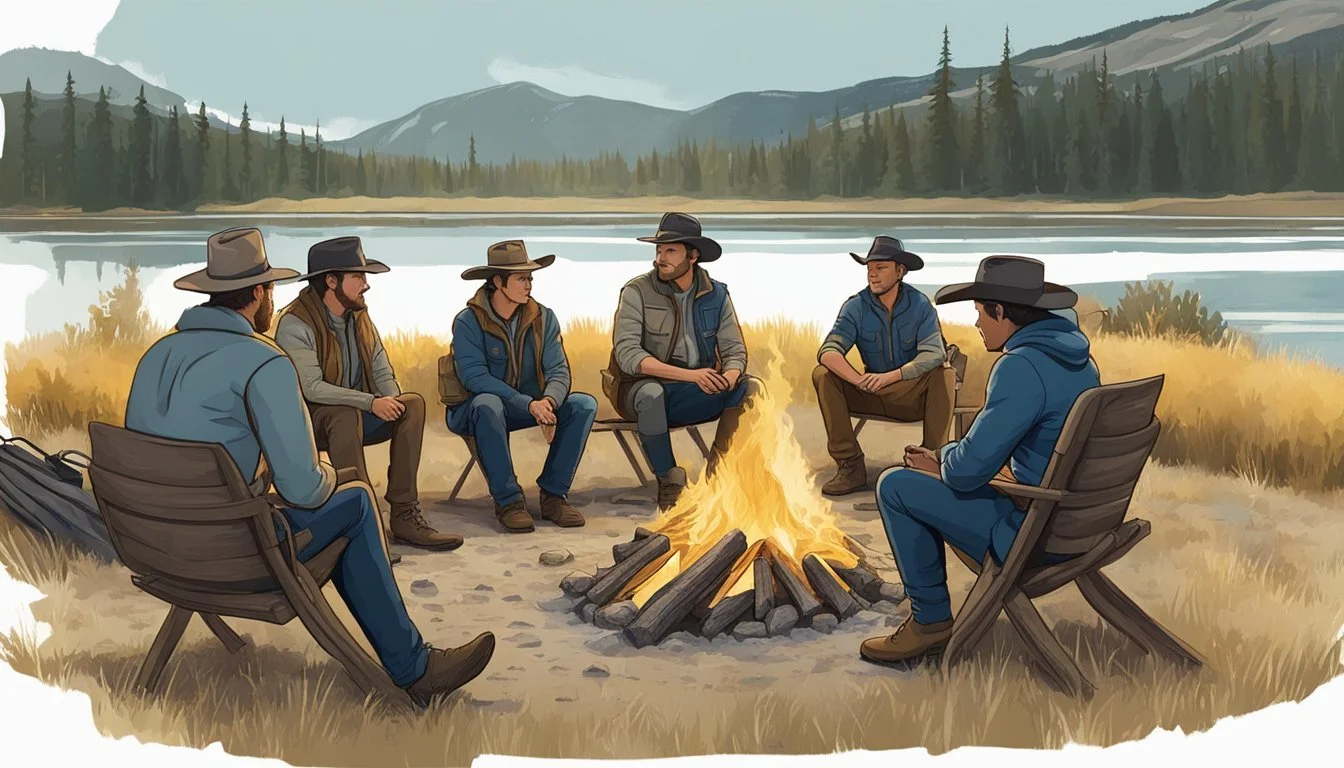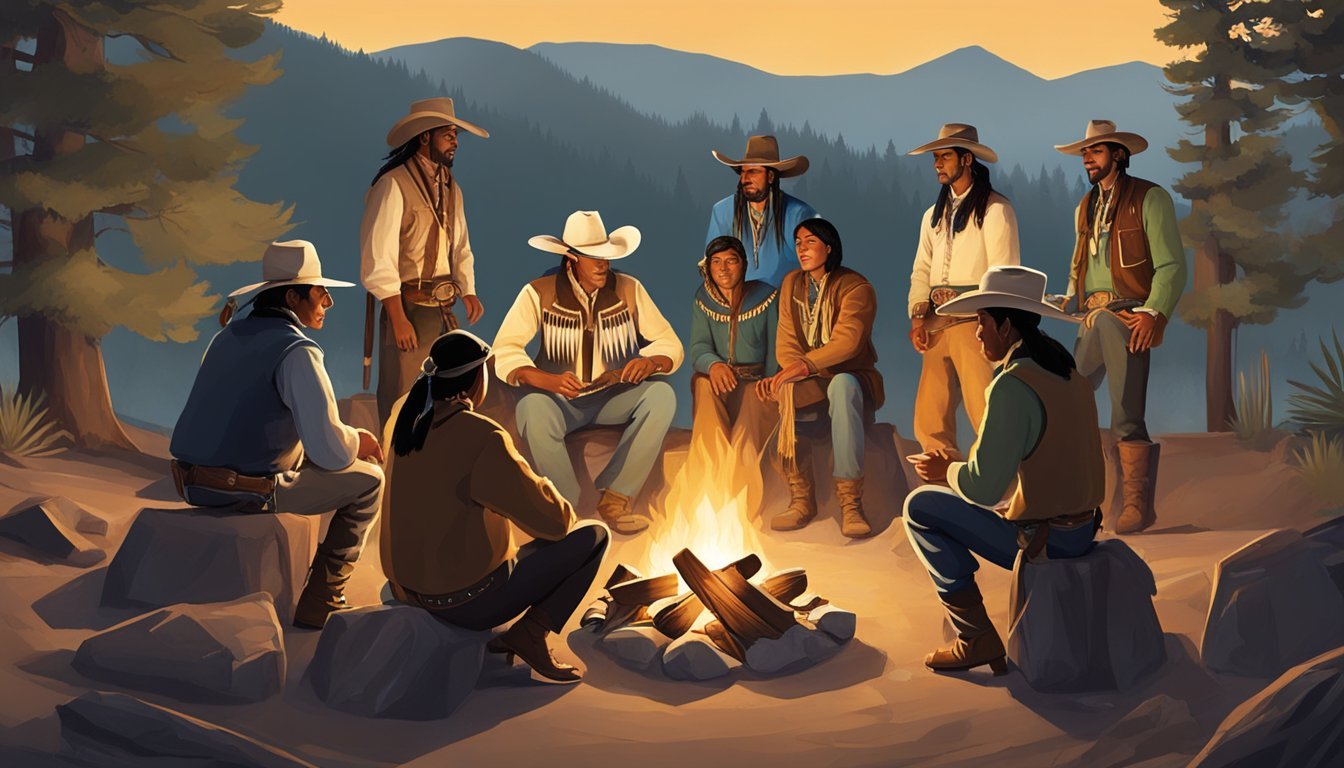Yellowstone Show Fandom Explodes as Fans Celebrate the Dutton Legacy
The Yellowstone show fandom has grown into a passionate community since the series premiered in 2018. Fans gather online to discuss the neo-western drama's complex characters, intense conflicts, and stunning Montana landscapes. The series, created by Taylor Sheridan and John Linson, follows the Dutton family as they navigate conflicts with neighboring Native American reservations and other threats to their vast ranch.
Yellowstone's rich storytelling and compelling performances have inspired viewers to delve deeper into the show's themes and plotlines. Online platforms like wikis and fan forums serve as hubs for enthusiasts to share theories, analyze character motivations, and speculate about future developments. The fandom's engagement extends beyond the main series to its prequels, 1883 and 1923, which explore the Dutton family's history.
As the show concludes its final season in 2024, the Yellowstone fandom remains active and dedicated. Fans continue to discuss the series' legacy, its impact on the modern western genre, and the potential for future spin-offs. The community's ongoing enthusiasm demonstrates the lasting appeal of the Dutton family saga and its exploration of power, family, and the American West.
Overview of Yellowstone
Yellowstone is a gripping Neo-Western drama series that has captivated audiences since its premiere. The show explores themes of family, power, and conflict in the modern American West.
Series Genesis and Creators
Taylor Sheridan and John Linson created Yellowstone for Paramount Network. The series debuted on June 20, 2018, marking a significant entry into the contemporary Western genre.
Sheridan, known for his work on films like "Hell or High Water," brought his signature style to the small screen. Linson's experience producing shows like "Sons of Anarchy" complemented Sheridan's vision.
The creators crafted a narrative centered around the Dutton family, led by patriarch John Dutton. Their storylines intertwine with local politics, land disputes, and family dynamics.
Yellowstone's Influence on Popular Culture
Yellowstone has made a substantial impact on television and popular culture. The show's portrayal of modern ranch life and the American West has resonated with viewers across the country.
Its success spawned spinoffs and prequels, expanding the Yellowstone universe. These include "1883" and "1923," which delve into the Dutton family history.
The series has influenced fashion trends, with viewers emulating the characters' Western-inspired attire. It has also sparked renewed interest in ranch tourism and Western lifestyles.
Yellowstone's depiction of complex family relationships and power struggles has become a topic of discussion among fans and critics alike.
Important Characters and Cast
The Yellowstone series features a compelling ensemble of characters brought to life by talented actors. At its core is the Dutton family, supported by key figures who shape the ranch's complex dynamics.
John Dutton and Family
John Dutton, portrayed by Kevin Costner, is the patriarchal figure at the heart of Yellowstone. He leads the Dutton family with unwavering determination to protect their vast ranch. Beth Dutton, John's fiercely loyal daughter, is played by Kelly Reilly. She's known for her sharp wit and ruthless business tactics.
Jamie Dutton, the adopted son portrayed by Wes Bentley, struggles with his place in the family. Kayce Dutton, played by Luke Grimes, is John's youngest son and a former Navy SEAL. His wife, Monica Long Dutton (Kelsey Asbille), brings a different perspective to the family as a Native American.
Key Supporting Characters
Rip Wheeler, played by Cole Hauser, is the loyal ranch foreman and Beth's love interest. He's a central figure in the Dutton's operations. Jimmy Hurdstrom, portrayed by Jefferson White, starts as a ranch hand and evolves throughout the series.
Thomas Rainwater (Gil Birmingham) is the chief of the nearby reservation, often at odds with the Duttons. Dan Jenkins (Danny Huston) is a developer who clashes with John over land rights. These characters add depth to the show's conflicts and relationships.
Cast Contributions to Success
The cast's performances have been instrumental in Yellowstone's popularity. Kevin Costner's gravitas as John Dutton anchors the series, while Kelly Reilly's portrayal of Beth has made her a fan favorite. The chemistry between the actors playing the Dutton siblings adds authenticity to their complex relationships.
Supporting actors like Cole Hauser and Jefferson White bring nuance to their roles, enriching the show's tapestry. The cast's ability to convey the tension and loyalty within the ranch community has been crucial to the series' success.
Plot Development
Yellowstone's plot centers on the Dutton family's struggle to maintain control of their vast ranch amid escalating threats. The narrative weaves together family drama, political intrigue, and violent conflicts set against the backdrop of Montana's rugged landscape.
Narrative Arc and Key Themes
The series follows the Dutton family's efforts to protect their land from various adversaries. John Dutton, the patriarch, leads his children through challenges posed by land developers, the nearby Indian reservation, and corrupt politicians. Family loyalty is a central theme, often tested by internal conflicts and external pressures.
The show explores the complexities of modern ranching, balancing tradition with progress. Environmental issues and the preservation of the West's natural beauty play significant roles in the storyline. Each season introduces new threats to the Dutton empire, forcing the family to adapt their strategies.
Conflict and Tension Points
Yellowstone thrives on its high-stakes conflicts. The Duttons frequently clash with the neighboring Broken Rock Indian Reservation over land rights and resources. This ongoing dispute forms a core tension throughout the series.
Corporate interests seeking to develop the land pose another major threat. These conflicts often escalate into violent confrontations, showcasing the show's gritty portrayal of the modern West. Political maneuvering adds another layer of complexity, with the Duttons navigating local and state politics to protect their interests.
Internal family dynamics create additional tension. Sibling rivalries and generational differences within the Dutton clan provide compelling subplots. The show's later seasons, particularly Yellowstone Season 5, heighten these conflicts as the family's power and influence grow.
Cinematic Elements
Yellowstone's visual style blends stunning landscapes with gritty realism. The show's cinematography and production design create an immersive neo-Western world.
Filming Locations
Yellowstone utilizes on-location filming in Montana and Utah to capture authentic Western scenery. The vast prairies, rugged mountains, and winding rivers serve as a breathtaking backdrop for the Dutton family saga. Key filming sites include:
Chief Joseph Ranch in Darby, Montana (Dutton Ranch exterior)
Park City, Utah (some ranch interiors and town scenes)
Yellowstone National Park (establishing shots and scenery)
These locations lend a sense of scale and grandeur to the series, emphasizing the characters' connection to the land.
Neo-Western Style and Aesthetics
Yellowstone embraces a modern take on classic Western visuals. The cinematography balances wide, sweeping vistas with intimate character moments. Key stylistic elements include:
Golden hour lighting to enhance Montana's natural beauty
Desaturated color palettes evoking a harsh frontier atmosphere
Handheld camera work for intense, personal scenes
Dramatic aerial shots showcasing the vast Dutton property
The show's costume design mixes traditional cowboy attire with contemporary clothing, reflecting the clash between old and new Montana. Props and set dressing further reinforce the neo-Western aesthetic, from weathered ranch equipment to sleek modern offices.
Cultural and Historical Context
Yellowstone taps into deep-rooted aspects of American history and contemporary social issues. The show's popularity stems in part from its exploration of enduring themes that resonate with modern audiences.
Relevance to Contemporary Issues
Yellowstone addresses land rights, a contentious topic in the American West. The Dutton family's struggles to maintain their ranch mirror real-world conflicts between landowners, developers, and Native American tribes. The series highlights tensions surrounding resource management and conservation efforts.
Land use debates depicted in the show reflect ongoing disputes in states like Montana and Wyoming. Yellowstone also touches on economic challenges facing rural communities, including the decline of traditional industries and the impact of tourism.
Historical Significance in Fiction
The show draws on rich historical themes from America's past. It references the legacy of Western expansion and its effects on Native American communities. Characters often allude to their family's long history in Montana, dating back to the late 19th century.
Yellowstone incorporates elements from the Prohibition era and the Great Depression, showing how these events shaped the region's culture. The series depicts the evolution of ranching and cowboy culture, illustrating how traditional ways of life persist alongside modern developments.
Native American history plays a crucial role in the show's narrative, exploring the complex relationships between indigenous peoples and white settlers' descendants.
Prequels and Spin-offs
The Yellowstone universe has expanded beyond the original series, delving into different time periods and characters within the Dutton family saga. These prequels and spin-offs offer fans new perspectives on the beloved franchise.
1883: A Yellowstone Origin Story
"1883" serves as a prequel to the main Yellowstone series, chronicling the Dutton family's journey westward. The show follows James and Margaret Dutton as they leave Texas and embark on a perilous trek across the Great Plains to Montana.
Set in the late 19th century, "1883" explores the harsh realities of frontier life and the challenges faced by early settlers. The series provides crucial backstory to the Dutton family's legacy and their eventual establishment of the Yellowstone Ranch.
Expanding the Yellowstone Universe
Several other spin-offs and prequels have been announced or are in development, further broadening the Yellowstone narrative. "1923" continues the Dutton family saga, focusing on a new generation during the early 20th century.
"6666" (also known as "Four Sixes") is set in the present day at the real Four Sixes Ranch in Texas. This spin-off promises to showcase a different aspect of modern ranching life.
"The Madison" (previously titled "2024") is slated for release in 2025. It's expected to feature Michelle Pfeiffer in a leading role, though specific plot details remain under wraps.
Fan Community and Engagement
Yellowstone's passionate fanbase has created a thriving online community. Dedicated viewers engage in lively discussions about the show's characters, plot developments, and potential future storylines.
Fandom Growth and Online Presence
Yellowstone Addicts, a Facebook group founded by superfan Cody Ring, has amassed over 170,000 members. This vibrant community serves as a hub for fans to connect and share their enthusiasm for the series. The show's official social media accounts on platforms like Instagram, Twitter, and Facebook regularly post behind-the-scenes content and cast interviews, further fueling fan engagement.
Fans express their love for Yellowstone through various creative outlets. They produce fan art, write fan fiction, and create memes based on memorable moments from the show. Some dedicated viewers even organize pilgrimages to filming locations, immersing themselves in the world of the Dutton family.
Fan Theories and Discussions
Online forums and social media platforms buzz with fan theories and episode discussions. Viewers eagerly analyze each episode title for hidden meanings and potential plot clues. The show's complex characters and intricate storylines provide ample material for speculation.
Unsolved murders and mysterious plot twists are hot topics among fans. They meticulously dissect scenes, looking for clues that might reveal the identity of a killer or predict future events. Spoiler warnings are common in these discussions, as fans respect others who may not be caught up with the latest episodes.
Yellowstone's fandom extends beyond casual viewership, with many fans developing deep emotional connections to the characters and their struggles. This passionate engagement has contributed significantly to the show's enduring popularity and cultural impact.
Impact and Reception
Yellowstone has garnered significant attention since its debut, becoming a cultural phenomenon that has influenced television, tourism, and public discourse. The show's portrayal of the American West and its complex characters has resonated with audiences and critics alike.
Critical Acclaim and Criticism
Yellowstone has received praise for its stunning cinematography and strong performances, particularly from Kevin Costner as John Dutton. Critics have lauded the show's exploration of themes like land ownership, family dynamics, and power struggles in the modern West.
Some reviewers have criticized the series for its melodramatic elements and occasional narrative inconsistencies. The show's depiction of Native American characters and issues has also faced scrutiny, with some arguing for more nuanced representation.
Despite mixed critical reception, Yellowstone has maintained a dedicated fanbase and sparked discussions about contemporary rural America.
Ratings and Viewership Trends
Yellowstone has consistently drawn impressive viewership numbers since its premiere. The show has broken records for cable television, becoming the most-watched series on the Paramount Network.
Ratings have shown a steady upward trend across seasons, with finales and premieres attracting particularly large audiences. The series' success has led to increased interest in Western-themed content and boosted ViacomCBS's streaming platform, Paramount+.
Yellowstone's popularity has extended beyond traditional viewing methods, with significant engagement on social media and streaming platforms. This widespread appeal has solidified its position as a cornerstone of contemporary television.
Production and Behind the Scenes
Yellowstone's authentic portrayal of ranch life stems from filming at real locations. The Chief Joseph Ranch in Darby, Montana serves as the iconic Dutton family ranch, providing a genuine 2,500-acre backdrop for many scenes.
The show's creators carefully select aspect ratios and camera lenses to give Yellowstone a cinematic feel. This attention to detail helps elevate the series beyond typical TV production values.
Kevin Costner leads the main cast as John Dutton. Other key actors include Luke Grimes, Kelly Reilly, Wes Bentley, Cole Hauser, and Kelsey Asbille. The ensemble brings depth to their characters, contributing to the show's popularity.
Behind-the-scenes photos shared by cast members offer fans glimpses into the production process. These images showcase the camaraderie among actors and crew during filming.
The show's success has not been without challenges. Reports of creative differences between Kevin Costner and series creator Taylor Sheridan emerged during later seasons, impacting production plans.
Yellowstone's attention to authenticity extends to its portrayal of Native American characters. Gil Birmingham's role as Chief Thomas Rainwater adds nuance to the show's exploration of land disputes and cultural conflicts.
Political and Social Themes
Yellowstone tackles complex political and social issues affecting rural America. The show explores tensions between preservation and development while examining power dynamics among various authority figures.
Land Ownership and Conservation
The Dutton ranch sits at the center of conflicts over land use and conservation. John Dutton fiercely defends his family's ancestral property against threats from land developers and lumber corporations. These entities often clash with local residents over resource extraction and environmental concerns.
The show portrays the challenges of balancing economic growth with preserving natural landscapes. It highlights how different groups - ranchers, Native Americans, and businesses - compete for control of Montana's valuable land and resources.
Yellowstone also touches on water rights disputes and debates over public versus private land use. These storylines reflect real tensions in the American West over natural resource management and conservation efforts.
Representation of Authority Figures
Yellowstone depicts various authority figures wielding power in rural Montana. The governor plays a key role, often navigating competing interests between constituents, businesses, and environmental groups.
Local politicians are shown grappling with issues like economic development, tourism, and preserving traditional ways of life. Law enforcement characters wrestle with upholding the law while respecting long-standing local customs and relationships.
The show examines how personal connections and family history influence decision-making in small communities. It portrays the complex web of alliances and rivalries that shape rural politics and governance.
Yellowstone also explores tensions between state and federal authorities, particularly regarding land management and jurisdiction on Native American reservations.
Series Evolution and Future
Yellowstone's popularity has sparked an expanded universe of interconnected shows. The franchise continues to grow with new spinoffs and storylines that explore different time periods and locations within the Dutton family saga.
Anticipated Developments
A new Yellowstone spinoff, previously called 2024, was filmed in Texas and is expected to debut in 2025. This series aims to further expand the Dutton family story. The 6666 spinoff, based on the iconic Texas ranch, remains in development but has faced some delays.
Paramount Network is exploring additional ways to continue the Yellowstone legacy. New characters and storylines may be introduced to keep the franchise fresh and engaging for fans.
Legacy and Long-Term Influence
Yellowstone has redefined the modern Western genre for television. Its success has inspired a new wave of shows set in rural America, exploring themes of family, power, and land ownership.
The franchise's influence extends beyond entertainment. It has sparked renewed interest in ranch life and Western culture. Yellowstone-inspired tourism has increased in Montana and other featured locations.
Taylor Sheridan's creation has also set a new standard for interconnected TV universes outside of the superhero genre. This approach may influence how other drama series are developed and marketed in the future.








